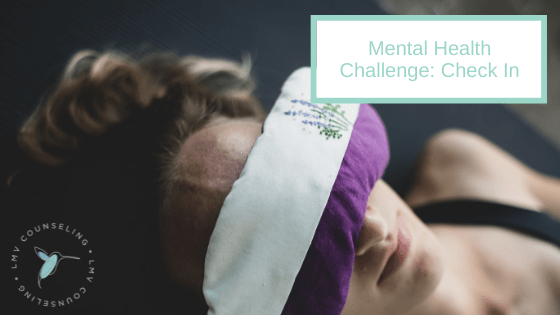Mental health has been a hot topic this past year. The anxiety and panic that set in at the beginning of the pandemic yielded to isolation and feeling overwhelmed. Everyone had to make an adjustment to their lifestyle in some way to accommodate the pandemic.
You now have a choice of the new way you would like to live your life. Are you ready to make your mental health a priority? You don’t have to return to the stressed out, overworked, always on-the-go lifestyle. Choose this time to make a lifestyle change. Listen to yourself and make changes to promote your mental health.
 Am I Okay? How Am I Right Now?
Am I Okay? How Am I Right Now?
A daily check-in is an easy and impactful way to begin making your mental health a priority. Ask yourself, “Am I okay? How am I doing right now?” Answer honestly. This simple question is one we ask friends and family members all the time, but rarely turn that question inward. Answer yourself with more than the “good” or “bad.” Practice focusing on how you’re feeling physically and mentally. Seek for a word that accurately describes your feeling. Excited? Inferior? Proud? Jealous? Exhausted?
Accurately seeking and identifying your emotions is key to developing emotional intelligence. Studies show a decrease in tension and an increase in problem-solving ability when you label your emotion and experience. This is called affect labeling. Having a hard time even labeling? Check out this list and post it somewhere you’ll see it often.
Listen to Your Body & Mind
 There will be positive and negative emotions that you identify. Stay with the emotion and accept it, even if it’s not comfortable. The more we avoid our feelings or try to push them down, the more anxiety will emerge. That anxiety reveals itself through compulsive and impulsive behaviors. For example, going shopping online or scrolling social media for hours to avoid your emotions. Or maybe drinking alcohol or smoking weed helps you mellow out. For the perfectionists out there, your anxiety may reveal itself by focusing on one specific project at work and not being able to control the intrusive thoughts about how that project could be better.
There will be positive and negative emotions that you identify. Stay with the emotion and accept it, even if it’s not comfortable. The more we avoid our feelings or try to push them down, the more anxiety will emerge. That anxiety reveals itself through compulsive and impulsive behaviors. For example, going shopping online or scrolling social media for hours to avoid your emotions. Or maybe drinking alcohol or smoking weed helps you mellow out. For the perfectionists out there, your anxiety may reveal itself by focusing on one specific project at work and not being able to control the intrusive thoughts about how that project could be better.
Uncover Mental Stability
Once you begin to listen to yourself and correctly identify your emotions, you can begin to learn more about what you truly need to regain or promote mental stability. Negative emotions are valid and signal us to a need that is unmet. Usually, they will signal that we lacking in a basic human need. We might be hungry, angry, lonely, tired, thirsty, horny, or need attention and love.
Meeting your innate needs:
- Hungry: Eat a nutritious meal or snack
- Angry: Utilize coping skills to work through the intensity of the anger, like yelling, punching a pillow with gorilla arms, or crying. This may signal the need to work through conflict with someone.
- Lonely: Reconnect with a person who you care for. Actually, pick up the phone and call them or FaceTime. Try to make time for the people you feel connected to.
- Tired: Take a nap. If napping isn’t an option, avoid excessive caffeine which will amp up the anxiety. Try making edits to your sleep hygiene to address chronic exhaustion.
- Thirsty: Drink a large glass of water mindfully and slowly. Wait 20 minutes and check in with your body again. Still thirsty? Continue this until you feel satiated.
- Horny: Engage in sexual experiences by yourself or with a partner/s.
- Need attention & love: Connect with someone or something that makes you feel loved. Don’t have a person to feel loved by? Try spending time with pets or tending to a garden. Research has shown giving love and attention to plants and animals increases our feelings of connectedness.

It takes practice to develop this mental health check-in skill. It’s like any other muscle. It has to be worked, stretched, and trained to allow it to be a powerful tool. For some, this is easier than others. If you’d like a coach and partner on this journey, we’re here to strengthen that inner voice. Our therapists can help you learn to turn down the anxiety through mindfulness and emotional awareness skills.

